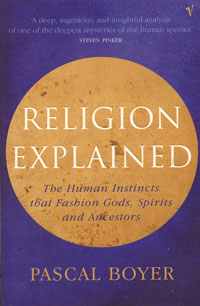
The Human Instincts that Fashion Gods, Spirits and Ancestors
Pascal Boyer
Vintage, London, 2001.
Drawing on anthropology, psychology, philosophy and other disciplines, Boyer has produced a terrifically stimulating account of the persistence of religious belief in our scientifically-informed times. Setting the scene, he outlines the remarkable diversity of religions: some gods can die, some spirits are stupid, salvation is not always central, faith is not always necessary, reassurance or comfort are not always provided. Given this diversity, it makes more sense to look at how variants of religious notions might be generated and then selected in cultural transmission, rather than positing some single origin of religion.
Boyer explains how the human mind may have evolved to experience the world in domain-specific ways, such that specialized systems produce inferences about the different aspects of the objects surrounding us. These specific inference systems are present in our cognitive architecture because they will have been selected for their contribution to solving the problems of our ancestral environment. Such systems will be compounded into a social mind capable of handling social exchange, parenting, friendship, coalition-building and so on.
"We like to think that we have certain concepts or hold certain beliefs because it is in our interest, because they seem rational, because they provide a sound explanation of what happens around them, because they create a coherent world-view, and so on. But none of these views explains what we actually find in human cultures. It seems more plausible that cultural transmission is relevance-driven. That is, concepts that 'excite' more inference systems, fit more easily into their expectations and trigger richer inferences (or all of these) are more likely to be acquired and transmitted than material that less easily corresponds to expectation formats or does not generate inferences. We do not have the cultural concepts we have because they make sense or are useful, but because the way our brains are put together makes it very difficult not to build them."(p.187)
What is valuable about this book is the way that it shows how we must ground our explanations of religions in what we are coming to understand about our evolved psychology, rather than relying on speculative and partisan stories about belief that we have never seriously examined.
PSYCHOLOGY OF BELIEF AND SUPERSTITION
© Paul Taylor 2006